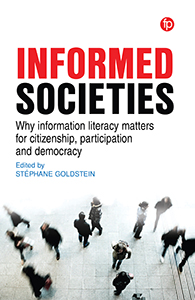Primary tabs
You don't need to be an ALA Member to purchase from the ALA Store, but you'll be asked to create an online account/profile during checkout to proceed. This Web Account is for both Members and non-Members. Note that your ALA Member discount will be applied at the final step of the checkout process.
If you are Tax-Exempt, please verify that your account is currently set up as exempt before placing your order, as our new fulfillment center will need current documentation. Learn how to verify here.
- Description
- Table of Contents
- About the author
In early 21st century societies, individuals and organizations are deluged with information, particularly online information. Much of this is useful, valuable or enriching. But a lot of it is of dubious quality and provenance, if not downright dangerous. Misinformation forms part of the mix. The ability to get the most out of the information flow, finding, interpreting and using it, and particularly developing a critical mindset towards it, requires skills, know-how, judgement and confidence – such is the premise of information literacy. This is true for many aspects of human endeavor, including education, work, health and self-enrichment. It is notably true also for acquiring an understanding of the wider world, for reaching informed views, for recognizing bias and misinformation, and thereby for playing a part as active citizens, in democratic life and society.
This ground-breaking and uniquely multi-disciplinary book explores how information literacy can contribute to fostering attitudes, habits and practices that underpin an informed citizenry. The 13 chapters each come from a particular perspective and are authored by international experts representing a range of disciplines: information literacy itself, but also political science, pedagogy, information science, psychology. This book covers
- why information literacy and informed citizens matter for healthy, democratic societies;
- information literacy’s relationship with political science;
- information literacy’s relationship with human rights;
- how information literacy can help foster citizenship, participation, empowerment and civic engagement in different contexts: school students, refugees, older people and in wider society;
- information literacy as a means to counter misinformation and fake news; and
- the challenges of addressing information literacy as part of national public policy.
1. Democracy, citizenship, empowerment: why information literacy matters
2. Digital literacy, information literacy, democracy and political science
3. Information literacy, political theory and critical theory
4. Information literacy and human rights – a global perspective
5. School libraries, information literacy and fostering civic engagement
6. How public libraries support democracy through information literacy
7. Information literacy and the mobilisation of human talent
8. Information literacy and the integration of refugees in host societies
9. Information literacy, lifelong learning and the needs of an ageing population
10. What intellectual empathy can offer information literacy education
11. Information literacy and misinformation: a psychology perspective
12.Information literacy and the societal imperative of information discernment
13. Information literacy and national policy-making
Stéphane Goldstein
Stéphane Goldstein is Executive Director of InformAll which, through research, analysis and facilitation, promotes the relevance, importance and benefits of information literacy in the library world and beyond. He is the author of reports, articles and other material on the relevance and applicability of IL to a range of settings, particularly in the context of the workplace. He is a strong advocate for IL, and as such, brokers relationships between information professionals and other stakeholders, and facilitates joint projects. He previously spent 10 years at the Research Information Network (RIN), where he led on information literacy activities; there, he was also responsible for project management and policy formulation in the broad area of information as a input and output of the research process. He previously worked in a range of science and research policy roles at the Medical Research Council and Research Councils UK.



